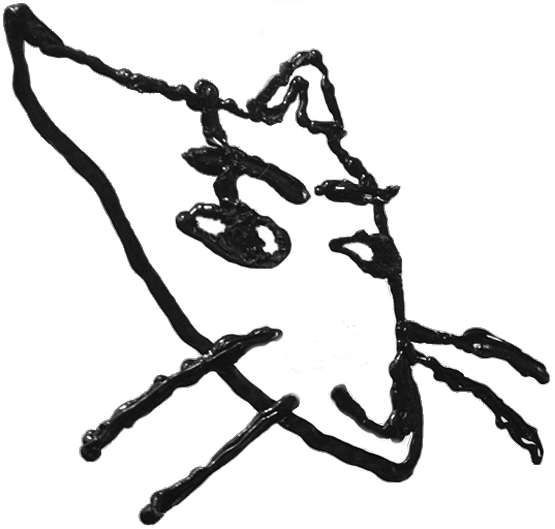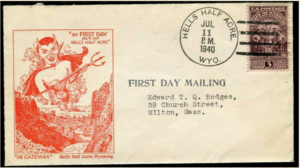Mouse Magazine editor Benjamin Ginzky talks with Chicago writer Ashley Chupp about “I’m Not Crazy, You’re Crazy,” her essay on the phenomenon of “Epstein Brain” from her 2018 self-published book of essays, “Pre-Apocalyptic.” They discuss the Epstein case, online feminist publishing, Calvinism, 9/11, Israeli espionage, fluoride, the history of child abuse, QAnon, “The Secret,” “Eyes Wide Shut,” and more.
—
I liked your book because it captured a certain urban millennial vibe. It seemed much more like people I actually know, millennials in the city who might be struggling, outside of the tech-world or other lucrative professional tracks.
Well, all of it was stuff I had tried to pitch and publish. Editors were like “no.” Or “this doesn’t make sense,” or “this isn’t our vibe.” So I just had to do it myself, and if ten people read them that’s better than zero.
When I was freelancing the only kind of pieces I could sell required me to share a lot of personal details, and in a way that aligned with a cultural narrative, one that bolstered some idea of what modern feminism should look like.
What was that?
An expectation that you shouldn’t challenge your readers. Or that if you challenge them, it’s only in the end to say “but look: we’re all stronger for what we went through, and I’m a girlboss who can handle anything and so can you.”
For a few years, I was only able to publish personal essays and little cutesy culture pieces, while struggling to gain name recognition. The first thing I ever had published was basically laying bare this abusive relationship. Now, I would never turn that into a piece for people’s entertainment. Then, I was writing it specifically to be like, “look what women go through, and here’s the moral of the story of how I became more powerful through trauma.” I’ve read hundreds of other essays like it, and I see it as just another piece of validation being sold as empowerment to women. And literally sold to women, like, “we want clicks on this, so that we get more advertiser money.”
I think that’s a good transition to start talking about the “Epstein Brain” essay because that also starts with this feeling of disgust with the way some kind of tic had developed in your online communities. So, can you just recapitulate, what is the Epstein Brain, and who has it?
It’s a name for this wormhole everybody fell down, where you realize a lot of this weird, fringe, conspiracy stuff is true. I think that is the Epstein Brain state of mind. Being suspended in this hell where for every answer you have a hundred more questions. You feel that nothing that you’ve ever been told can be counted on, and everyone around you has a vested interest in a narrative.
Whose mind gets boggled this way?
I feel like it is almost the true “horseshoe effect.” The centrists and the liberals tend not to have much interest in questioning the default narrative, but the further you get on the outskirts left or right, the more you tend to get people who are invested in questioning.
So my mother is a full-on, QAnon-type libertarian. To me she asks all the right questions but gets the wrong answers, But now, there are a lot of things I would have an easier time talking with her about then I do with the more centrist liberals that I know. Because they’ve really bought into this idea that questioning what the experts tell you is inherently anti-intellectual, as opposed to questioning being the actual intellectual response.
It’s interesting you bring up your mother, because I feel those were two of the key moments in the Epstein Brain essay. One, where you talk about your mom’s obsession with fluoride, but sort of look into this new solidarity, or at least sympathy you feel for her perspective. But then the end of the essay is this, if you’ll allow me, paranoid moment, where you suspect this little old lady on the street of being some kind of government agent. Do you think the Epstein brain phenomenon is one where we will have a potential inter generational connection, or will we remain alienated?
That’s a really good question, because I really want it to be a point where we can come together across a lot of different areas. This conspiracy is something I can talk to my mother about, which is something I didn’t have for a lot of years, because this transcends ideological differences. But there’s something inherently alienating about the journey of discovery. You’re questioning, but feel like you’re the only person you can trust.
You also realize how much this is a fact of the ruling class. Sexual abuse can be a way for someone to make themselves useful to the rich and powerful. After Epstein was arrested and got killed, I started reading more and realizing this is really common. I’ve read blind items on gossip blogs about these Hollywood parties where they abuse teenage boys who want to break into the industry. There’s also the theory that Eyes Wide Shut was a veiled portrayal of these weird perverted rituals of the ruling class.
To me, Eyes Wide Shut screens as a black comedy. Everything serious in it seems over-the-top and very funny. I think the central joke in the film is that you might feel like there’s a secret society with access to beautiful women, where every desire is fulfilled, but that’s just what the sexual world feels like. Other people’s sex always feels like some secret society you’re not in. And Tom Cruise’s character screens as a closet case, because the whole movie is him repeatedly not having sex with beautiful women. He goes around wondering “what is the great mysterious force subverting the fulfillment of my sexual desires?” and attributing it to this secret society. If you over interpret the joke is on you too.
But that doesn’t mean these things don’t happen in real life.
Yeah, like you can explain it with the solidarity theory, that the abuse is this sick thing done to compromise people, to say “well, you’re in this club now we have this on you, you have this on us.” But I find it more compelling to look at it materially. This must have been an exchange for something, like the barter of information.
What I don’t understand are Epstein’s connections with science and tech, his obsessions with bio genetics and stuff. If he’s intelligence, it’s weird. It could be a blustery part of his cover and misdirection, or just his self-aggrandizing personality. They say in the 80s, he liked to go around telling people he was an international spy.
There’s the thing about how he was trying to live forever or keep himself alive as long as possible to father a bunch of children with different women.
Here’s my version of Epstein brain. When I see stuff like that come out I get this feeling it’s disinformation, it’s a distraction.
Like, did you watch “Wormwood?” It’s an Errol Morris documentary Netflix series. Part of the story is that kind of disinfo, the idea that the whole revelation of the CIA’s LSD experiments, while true, was sensational enough to strategically distract from their maybe assassinating a scientist because he has suspicions about US use of biological warfare in Korea. But some people I know who watched the series only remember the LSD thing anyway. The move is, they put out something crazy sounding to grab your attention, so you don’t pay attention to the more boring disclosure that they consider more truly sensitive.
I said this about the “Epstein Didn’t Kill Himself” memes. I said that it was an opp so that people would take it less seriously. It became so annoying, everyone started ignoring it. “Epstein Didn’t Kill Himself” was a white noise meme that I really think was at least taken advantage of by people who had an interest in making sure no one took this seriously. The more you find out the less you can trust even your own judgement.
Now, I try to entertain everything but expect nothing, even if that’s something like QAnon. I think QAnon reaches the wrong conclusions about everything. Because they have a worldview in which they’re really trying to validate the idea that Trump and his kind of brand of conservatism is going to save us. So again, if you’re trying to validate a belief you already have, then you’re not going to get to the truth about everything. But what I respect about QAnon is they were asking a lot of these questions even earlier than leftists were.
But I mean, their way of doing things is like a parody of conspiracy theory. It’s like hyper pattern searching right? It’s all numerology and hand gestures.
Yeah. It reminds me of reading, like, New Age esoteric stuff. You know, looking at the numbers trying to find hidden meanings in them, or finding secret validating messages from the universe in everything.
Which is interesting because it parallels Trump’s own worldview of “positive thinking” and the whole Oprah “Secret” thing that’s become so widespread. I feel like that is part of what created the ground for something like QAnon, which is optimistic in its weird way, to spread.
There is a lot of similarity. Maybe for the same reason that I’m interested in conspiracies, I also love reading that New Age stuff. I’ll watch YouTube videos of people who are into “The Secret” and “manifesting.” They sound a little insane to me, but they also seem so genuinely convinced that they’ve discovered the truth.
Maybe that’s where QAnon really went wrong—they’re just too confident in themselves, you know?
Right. I grew up in a college town in the Midwest where the culture was influenced by a lot of post-hippy wash-ups, in a sort-of eternal seventies. Everyone was a 9/11 and GMO truther. I reacted badly against all of those “alternative facts” and I was very pro-rationalist expert discourse. So that’s been interesting, to see expert authority erode.
For me, growing up Calvinist made me crazier the older I got. The idea of predestination seemed inherently very cruel, yet whenever I had questions they were always met with, “It’s not for us to understand God’s plan.” I hated that. An omnipotent being just randomly picking whose immortal soul gets saved and whose gets condemned is such a disgusting concept to me that I absolutely had to understand it. But you can’t, really. I wanted to, though, so I tried reading every book on the “religion” bookshelf in my father’s office. The Biblical analyses, the self-help and lifestyle books masquerading as doctrine, all these works by, like, C.S. Lewis or Martin Luther that I don’t even think my parents ever actually read.
And that’s where the pitfall of overinterpretation, like with QAnon, becomes understandable and even relatable to me. Grasping at straws at least feels preferable to shrugging my shoulders and letting it all go.
Yeah, exactly. To me, the idea for QAnon or cruder Epstein truthers, that there’s some overarching ritual thing, anywhere, that just to me speaks of the desire for things to make sense. Because if your enemies are in a cult then they have a playbook right?
It is comforting for there to be explicitly evil bad guys. It really is very human to be ruled by fear and judgment, and I think that’s why conspiracies can get a little addictive when they provide righteous targets. I believe it’s the same need to feel correct and virtuous that drives any kind of moralizing. Nobody is immune to that. So I resist getting too deep in mythology and try to look at what is the material reason this might be happening.
Have you read We Believe the Children? It’s about the 80s-90s “Satanic Panic” and shows how exactly that urge to find explicitly evil conspiracies behind things comes from our discomfort with the more basic material reality. Post-60s, you had two-earner household putting their kids in daycare – people were anxious about not being good parents because they were literally working too much. And then on top of that child abuse wasn’t really talked about before the 50s and 60s, so when awareness started to spread it got mixed up with pop psychology and tabloid stuff about cults. So people went on witch hunts, basically pressured a lot of kids into giving testimony about ritual cults, and threw out due process for the defendants because the kids were supposedly so traumatized that a normal criminal proceeding couldn’t work.
That’s really interesting and you’re absolutely right about this revival of old moral panics. As someone who grew up with a very strict religious background, I think confronting material reality is really the only solution.
We had things like “modesty checklists” and as isolated, homeschooled girls we ended up policing each other’s clothing and behavior. It was a panic around teen sexuality to justify subjecting us to misogyny, but all we could identify was that anger and betrayal we felt when we saw someone else choose not to follow the same rules we were too afraid to break.
I was also uneasy with the homophobia — actually meeting gay people I got over it. I really thought there was something there I was supposed to be afraid of. Most judgment stems from fear, and history has taught us over and over that if you can get people to fear something, you can convince them to hate or even destroy it.
So, to return to the question of Epstein and the strange little flash-in-the-pan life of anybody paying attention to it, it seems to kind of be related to #MeToo. Right now we seem to be seeing #MeToo getting buried. The Epstein thing wouldn’t have come to light for most people except for #MeToo, but at the same time #MeToo was a kind of a narrow way to understand it. But the burying of the Epstein case was in its way a prelude to how #MeToo is being buried now.
There was this Jezebel piece that they ran after Epstein was killed, claiming it is somehow misogynistic to ask who killed Jeffrey Epstein, because that would take attention away from his female victims. But how is there justice for the victims if we don’t figure out in whose interest justice is being subverted? It seems obvious, but somebody in Jezebel ran this piece saying “it’s time to stop talking about who killed Jeffrey Epstein because it’s disrespectful to these girls and what they’ve gone through.” It was tone deaf, and felt like somebody cynically looking at the Epstein thing to find the most shallow feminist message possible. Trying to tackle something like ritual billionaire sex abuse through this tiny lens of liberal girl boss feminism… you can’t do it.
How can you say anything new or interesting anyway if you can’t comment on the world around you? Liberal feminism doesn’t let you say much new but it is very commodifiable, selling empowering essays on Bustle.com, selling t-shirts with “nevertheless, she persisted” on them. That kind of feminism is a product, or, I guess, a product and a means to sell it. It’s not really a critical lens, it’s not really a point of view. It’s just an industry.
So now I wonder if in twenty years we’ll see young women talk about Epstein the way they sometimes talk about Ted Bundy, semi-ironically sexualizing him. It’s such a cursed thought, but the line between investigating conspiracy as truth-seeking and reveling in conspiracy as morbid entertainment is tough to identify. You want to believe that the Epstein stuff is so horrifying and so clearly a systemic operation that we won’t stop taking it seriously, but the cynic in me is resigned to a future of Lifetime original movies titled shit like “Trapped on Pedophile Island.”




